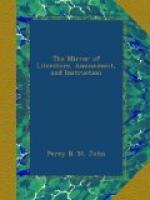Without any intention of advocating the doctrine, or of commending the reputed practice of the Pythagoreans, ancient or modern, I must be allowed to reprobate the abuse of fermented liquors. Although wine was invented, and its use allowed “to make glad the heart of man,” and although a moderate and prudent indulgence in it can never excite reprobation, or cause mischief, still the sin of drunkenness is an extensive and a filthy evil. Not only does it demoralize, debase, and finally destroy its unhappy victim, but it renders him incapable of performing the ordinary duties of his station; constituting him an object of disgust to others, and of pitiable misery to himself. It is well to talk of the Bacchanalian orgies of talented men, and to call them hilarity and glee. The flashes of wit “that were wont to set the table in a roar;” the brilliancy of genius, that casts a charm even over folly and vice; the rank and fame of the individual, no doubt, increased the fascination of his failings; but however bright and wonderful may be the coruscations of his talent, while under the influence of wine, his frame is debilitated, tottering, and imbecile, when the stimulus of the potation has subsided.
But I do not proscribe indiscriminately all stimulus. Those whose occupations are laborious, and who are much exposed to our variable climate, require an absolute stimulus, over and above what they eat. Dr. Franklin advocated a contrary doctrine, and inculcated the fact, that a twopenny loaf was much better for a man than a quart of beer; and he adduces the horse and other beasts of burthen as examples of the inefficacy of the use of fermented liquors. But all this is founded upon decidedly erroneous premises. To enable a hard-working horse to go through his toil with spirit, he must have corn, or some other article subject to fermentation. Now, the horse, as well as many other animals, have stomachs very capacious, and probably adapted to the production of this fermentation. So that corn is, in fact, a powerful fermented stimulus to the beast.
Let us then assume, that stimulus in a certain degree is necessary to sustain the strength and invigorate the frame of the toiling man; and the best proof of its good effect is the comfort and energy which it imparts to its consumer; but if this necessary stimulus be exceeded, then it is abused, and every mouthful in addition becomes ultimately poisonous. The first effect which is produced is upon the internal coat of the stomach, as we may learn from the warmth which we feel. The repetition increases the circulation of the blood, which seems, as it were, to dance through the veins; the pulse becomes quick and full, the eyes sparkle, and the imagination is quickened; in short, the whole frame is excited, as is evinced by every word, look, and action. If the affair end here, well and good; but we will suppose that the potation goes on, and very speedily a new effect is produced. The brain, oppressed by the load of blood thrown up




